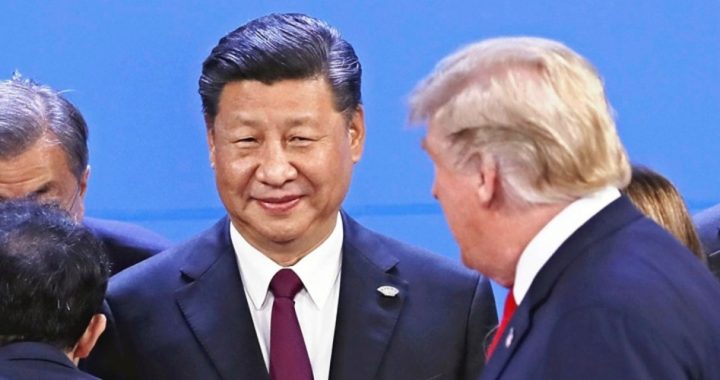
Returning to the United States on Air Force One from Buenos Aires following a two-and-a-half-hour dinner with Chinese General Secretary Xi Jinping on Saturday night, President Trump said he had squeezed out “an incredible deal” from the communist leader: “If it happens it [will go] down as one of the largest deals ever made,” he added, explaining: “What I’ll be doing is holding back on [raising] tariffs. China will be opening up. China will be getting rid of tariffs … China will be buying massive amounts of products from us.”
On the other hand, Chinese Foreign Minister Wang Yi and Commerce Vice Minister Wang Shouwen, who both attended the meeting, had a vastly different take on that agreement. Following the dinner they said that the talks to finalize the details would focus only on removing altogether Trump’s tariffs without any mention of a 90-day deadline. Nothing was said about China’s predatory behavior in the theft of intellectual property in its quest to become the global leader in digital technology. Nor was mention made of China relenting from demanding the blackmail transfer of that technology in exchange for access to the Chinese market by American companies. Nothing was said about Chinese cyberwarfare being waged on America by hundreds of Chinese hackers, or about backing off on its subsidizing critical industries such as steel and aluminum in order to keep prices low so they can corner the global market. And nothing was said about any willingness by China to forego the manipulation of their currency to gain an advantage over American producers wanting to sell to Chinese consumers.
Chinese hardliner Peter Morici, an economist at the University of Maryland, said that Xi played Trump for a chump: “President Xi has successfully slow-walked President Trump. The president has fallen into the same trap as Barack Obama, George W. Bush and even Bill Clinton. He will get more platitudes and promises and very few results.”
The White House put a positive spin on the so-called agreement:
President Trump has agreed that on January 1, 2019, he will leave the tariffs on $200 billion worth of product [being imported from China] at the 10 percent rate, and not raise it to 25 percent at this time.
Both parties agree that they will endeavor to have this transaction completed within the next 90 days. If at the end of this period of time, the parties are unable to reach an agreement, the 10 percent tariffs will be raised to 25 percent.
China will agree to purchase a not yet agreed upon, but very substantial amount of agricultural, energy, industrial and other product from the United States to reduce the trade imbalance between our two countries. China has agreed to start purchasing agricultural product from our farmers immediately.
The so-called architecture of the agreement is supposed to cover the Chinese forced transfer of American technology, protections for intellectual property from Chinese blackmail, non-tariff barriers, cybertheft, and cyberwarfare.
Morici may be right: The communists likely aren’t interested in an agreement that would thwart their intentions to steal American technology in order to become the world’s premier technology powerhouse. The agreement deadline is March 1, just before the start of the Chinese Communist Party’s annual national legislative session, a time when participants taking a soft line with the United States may not only be putting their party positions in jeopardy but also their lives.
If instead top communist officials are able to boast of a reduction or delay in the implementation of Trump’s tariffs without giving back anything substantial in return (other than buying an unspecified “substantial” amount of agricultural goods from America), then their positions, for the moment at least, would remain secure. And if Trump threatens to raise tariffs, the Chinese will once again attempt to buy more time for more discussions and negotiations to complete the transaction. And on and on it will go.
Photo: AP Images
An Ivy League graduate and former investment advisor, Bob is a regular contributor to The New American magazine and blogs frequently at LightFromTheRight.com, primarily on economics and politics. He can be reached at [email protected].
Related articles:
Trump-Xi Showdown in Buenos Aires Begins Friday
Study: World’s Most Expensive Military (Ours) Could Lose War to China




